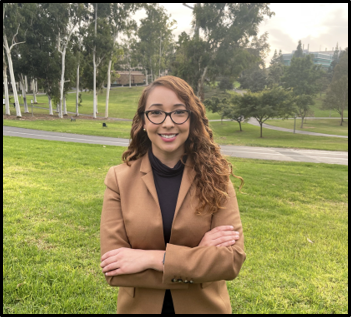2022 Student Paper Competition Winning Abstracts
Congratulations to the student paper competition winners and honorable mentions! The student paper competitions awards are proudly sponsored by the Divisions.
COMMUNITY RESEARCH AND DEVELOPMENT DIVISION
 |
Winning Title: "Policy Relay: How Affirmative Consent Went from Controversy to Convention"
Author: Katelyn Rose Malae
Affiliation: University of California, Irvine
E-mail: kmalae@uci.edu
Abstract:
This article analyzes how a formerly mocked policy idea became a widespread solution. Through content analysis of newspaper articles and legal documents, I develop a framework that extends timelines of social movement influence, expands the range of actors and locations of mobilization, and traces how activists frame policy ideas over time: the policy relay. This framework allows for an analysis of how opponents unintentionally advanced the reform process in 1993 by turning its originators into laughingstocks. Anti-rape advocates eventually reformulated the policy in 2014. This time, the origin was removed from the story, presenting a concise narrative that credited politicians and college administrators, rather than activists, for the reform. By tracing the ideas of a movement, rather than focusing on organizations or public protests, I uncover a complicated process of social change, where consequential actors work across different settings to ignite reforms and strategically remove controversial aspects from narratives of social change.
CRIME AND JUVENILE DELINQUENCY DIVISION
Winning Title: "White Kids on the Block: On Race, Identity, and Criminality Among Incarcerated White Youth"
Authors: Julissa O. Muñiz and Jessica M. W. Marshall
Affiliations: The University of Texas at Austin and Northwestern University
E-mails: julissa.muniz@austin.utexas.edu and JessicaMarshall2022@u.northwestern.edu
Abstract: Information not provided.
DISABILITY DIVISION
Winning Title: "'False Confession in Wrongful Convictions: An Analysis of Age, Cognitive Disability, and False Confession among Exonerees"
Author: Eileen L. Huey
Affiliation: Texas A&M University
E-mail: eileenhuey@tamu.edu
Abstract: Information not provided.
EDUCATIONAL PROBLEMS DIVISION
 |
|
Winning Title: "Brokers & Boundary Managers: School Expulsions Amidst the Non-Punitive Turn"
Author: Rebecca D. Gleit
Affiliation: Stanford University
E-mail: rgleit@stanford.edu
Abstract:
Like many American institutions, K-12 schools are increasingly embracing a rhetoric of non-punitiveness and seeking to supply resources instead of harsh punishment. Using ethnographic data from a diverse, suburban, well-resourced public high school, I explore how institutional actors manage this central role in the provision of goods and services. I find that school staff lack the capacity to successfully serve as brokers for all their constituents, thus forcing decisions about how to allocate their limited resources. Staff navigate these constraints by strategically managing the boundaries of the institution, redefining who gets to remain a member and thus who they will continue brokering for. I describe how and when these exclusions occur and show that students from less advantaged backgrounds are at higher risk of expulsion because they depend more on the school for resources than their privileged peers. Further, informal methods of exclusion become favored in this non-punitive pivot, meaning that official data likely undercount the number of students forcibly removed from their schools. As institutions take on more resource brokering amidst the turn towards non-punitiveness, the decisions of boundary managers – those actors with the power to enroll and expel members – become increasingly consequential for the allocation of public resources.
 |
Winning Title: “You Selling?’: Snack Sales and the Construction of Deviance in a High School”
Author: Karlyn J. Gorski
Affiliation: The University of Chicago
E-mail: gorski@uchicago.edu
Abstract:
Youths’ affinity for snack foods is well-documented; in various contexts, they sell chips, candy, and other goods. Adults may frame such sales as either entrepreneurial or deviant, which can contribute to positive youth development (on one hand) or cycles of disengagement and criminalization (on the other). Drawing on ethnographic and interview data from Hamilton High School, I show how adults’ criminalization of snack sales led the activity to more closely resemble that which they feared: drug sales. Snack sales constitute one way in which youth exercise agency in the face of broad institutional control, leading some to challenge the legitimacy of the school overall. These findings represent a case of how youth experience “criminalized childhoods” in a school context.
Honorable Mention Title: "Immigrant Age-At-Arrival, Social Capital, and College Enrollment"
 |
Author: Irina Chukhray
Affiliation: University of California, Davis
E-mail: ichukhray@ucdavis.edu
Abstract:
Driving the present study is the largely understudied college information search process among immigrant youth, defined as those who are foreign born and who came to the US under the age of 18 (often termed the 1.5 generation). The search process is when students seek out multiple sources for information about college (i.e., social capital resources). Understanding mechanisms that impact immigrant youths’ educational attainment will inform educational policy and practitioners, such as high school counselors, as well as helping to increase immigrant youths’ attainment. Using nationally representative data from the High School Longitudinal Study:2009, this study analyzes immigrant students’ college enrollment outcomes three years after high school completion and contributes to the literature by disaggregating foreign-born students into age-at-arrival groups. Findings indicate that, contrary to theory, age-at-arrival does not predict college-going. Additionally, access to social capital resources does not predict college-going among immigrant youth, where for example, speaking to a high school counselor about college going does not significantly improve later arrivals’ college enrollment. I conclude by discussing the possible role of college-focused conversation content (unobserved here), timing of such conversations, and selectivity influences.
Honorable Mention Title: "Hospice Education: Palliative Schooling in the Age of Equity"
 |
Author: Jienian Zhang
Affiliation: University of Wisconsin-Madison
Email: jienian.zhang@wisc.edu
The study of color-blind racism has been central to understanding why racial inequalities persist in schools. I argue that merely increasing racial awareness through both official and unofficial school policies does not alleviate educational racial inequalities. Instead, I call for re-imagining caring in education to promote racial equity. Ethnographic data of a high school from a wealthy, suburban, and progressive school district reveal that some teachers’ response to struggling students of color may be characterized as “palliative schooling.” The schooling is palliative for two reasons: 1) it prioritizes students’ comfort in the immediate moment (a form of caring), and 2) it assumes low academic expectations from students (a form of hopelessness). Caring and hopeless are intertwined with each other as my data show. Moreover, palliative schooling thrives in a school culture that explicitly discusses race and racism. While some white teachers understand racial inequalities, some simply follow directives from school leadership. In a racialized organization, such as the high school in my field work, palliative schooling only reinforces racial inequalities rather than disrupts them. My findings challenge how we think about caring because progressive agendas may sustain racial hierarchies through a counter-intuitive bond between caring and hopelessness.
ENVIRONMENT AND TECHNOLOGY DIVISION
Brent K. Marshall Paper Winning Title: "The Business of Adaptation in Bangladesh"
Author: Danielle Falzon
Affiliation: Brown University
E-mail: danielle.falzon@gmail.com
Abstract:Information not provided.
FAMILY DIVISION

Winning Title: “He Was Able to Rely on Me’: Negotiating the Sibling Intragenerational Bargain among Latino First-generation College Student Families”
Author: Estéfani Marín
Affiliation: University of California, Irvine
E-mail: marine2@uci.edu
Abstract:
Objective: Despite research highlighting the agentic role of children in generating familial capital, the role of siblings in familial capital accumulation has received limited attention.
Background: Contrary to the resource dilution model that posits family resources decrease as the number of children increase, this study builds on intragenerational mobility studies by highlighting the agentic role of siblings in producing familial capital.
Methods: The author conducted and analyzed in-depth interview data from 41 Latino first-generation siblings to examine how they mobilize educational resources.
Results: Findings suggest that Latino families engage in a sibling intragenerational bargain to actively produce capital. In negotiating the sibling intragenerational bargain, Latino first-generation students (1) contribute to the family’s intragenerational mobility by providing support and transmitting capital and (2) repay sibling sacrifices and help with their academic success. Furthermore, sibling order and educational level shaped the type and exchange of educational capital negotiated in the sibling intragenerational bargain.
Conclusion: These findings have important implications for intragenerational mobility and understanding of Latino sibling support.
Keywords: siblings; familial and educational capital; intragenerational mobility; Latino first-generation college students
 Honorable Mention Title: “What’s Love Got to Do with It? How LGBTQ Youth’s Relationship with Their Caregiver Impacts Their Well-being in and out of Foster Care”
Honorable Mention Title: “What’s Love Got to Do with It? How LGBTQ Youth’s Relationship with Their Caregiver Impacts Their Well-being in and out of Foster Care”
Author: Heather M. Lepper-Pappan
Affiliation: The University of Oklahoma
E-mail: heather.lepper-pappan@ou.edu
Abstract:
Lesbian, gay, bisexual, transgender, and queer (LGBTQ) youth are disproportionately represented in the foster care system, often with poor permanency and well-being outcomes. A key protective factor for youth in the foster care system include supportive relationships with family members and caregivers. Little research has studied the association between well-being and that protective factor for LGBTQ youth. This study uses the National Survey of Child and Adolescent Well-Being (NSCAW-II) to analyze child well-being outcomes among youth in foster care, focusing specifically on LGBTQ youth and their relationship with their caregiver. Using propensity score matching (PSM), I find that youth placed in foster care have higher rates of both internalizing and externalizing behavior problems compared to youth involved in the child welfare system but who remained in their home. Propensity adjusted logistic regression models reveal that for LGBTQ youth, caregiver reports of clinically significant behavior problems increase as the youth’s perception of their relationship with their caregiver increases. These findings have direct implications for how the foster care system and caregivers for LGBTQ youth interact with these adolescents to improve well-being outcomes for this vulnerable population.
GENDER DIVISION
 |
Winning Title: "Negotiating Utopia: Ethnography and Theorizing from Entangled US Trans Subjectivities"
Author: prabhdeep singh kehal
Affiliation: Brown University
E-mail: prabhdeepsinghkehal@gmail.com
Abstract:
Negotiating Utopia: Ethnography and Theorizing from Entangled US Trans Subjectivities Native feminist theories have argued and shown that all people living in the U.S. are racialized, gendered, and entangled with settler colonialism because people are given the opportunity to take part in settling processes that dispossess “other-ed” peoples. In the case of the US research academy, existing academic research practices, such as gender conformity in ethnographic research, can provide a means of conformity with the US settler university. Partially in response, reflexive approaches use a lens of multiple identities to account for how researchers’ social positions are formed in relation to gender domination. Yet, such approaches can maintain researchers’ position as the subject doing research rather than as researchers negotiating their positions as both subjects doing research and objects of research. Taking the case of queer and gender non-conforming researchers who must cis-ify themselves for ethnographies, this paper considers how an ethnographic experience of unsettling can enlist researchers into a colonial process of settling through gender conformity. Who emerges from the field when ethnographers become implicated in their own embodied violence? Drawing on Native feminist theories, queer empiricist sociology, and Du Boisian sociology, the paper theorizes researcher subjectivity formation through an analysis of fieldnotes. Negotiating utopia is a framework for phenomenological analysis of subjectivity formation and an alternative conception of reflexivity. The framework enables researchers to account for how emotions mediate a subject-object division in research and how settler colonialism, cisheteropatriarchy, and faith are entangled in US academic practice.
 |
Honorable Mention Title: “Patriarchal State Projects and the Exploitation of Women and Femininities: A Case Study of Japan’s Sex Industry and Gendered Expansionism (1870s-1950s)”
Author: Noelie Frix
Affiliation: Kansas State University
E-mail: nfrix@ksu.edu
Abstract:
This case study employs intersectional gender theory and adopts the critical perspective in human trafficking literature to explore how the Japanese state and its officials have employed prostitution and sex-related legislation to further their political, economic, and military interests, both in peace and war time, over the 1870s-to-1950s time span. In particular, this paper investigates how sex work and sex trafficking have been understood, how and why these exploitative systems morphed over time, and who has benefitted. It finds that sex-related legislation has largely been coopted by the state’s leading actors to bolster their power and influence, control women, and improve their international standing. Historical and cultural attitudes towards race, women, and sex continue to exercise a significant influence on Japanese officials, impeding efforts at effective prosecution of sex crimes and severely hindering the protection of individuals involved in the sex trade. Notably, the criminalization of prostitution undermines women’s human and labor rights, complicates anti-trafficking efforts, and renders victims more vulnerable by making them largely invisible and labeling them “criminals.” In order to craft effective solutions to sexual exploitation, it is crucial that policymakers explicitly address gendered and racial biases and acknowledge how masculinized control of femininities and women have affected and continue to influence exploitative systems.
GLOBAL DIVISION
 |
Winning Title: "From Black Lives Matter to EndSARS: Women’s Socio-political Power and the Transnational Movement for Black Lives"
Author: Adaugo Pamela Nwakanma
Affiliation: Harvard University
Email: pnwakanma@g.harvard.edu
Abstract:
The relationship between Black Lives Matter (BLM) and anti-police brutality movements abroad reveals the variety of ways in which Black feminist theories of justice have taken root in public discourse. The EndSARS movement in Nigeria, Africa’s largest economy and the world’s largest Black nation, illustrates the influence of BLM transnationally and some of the continuities and discontinuities between anti-police brutality movements across contexts. This article examines these two movements in tandem and develops a theory of political behavior that builds on transnational Black and African feminist insights. More specifically, the article considers how Black feminist articulations of intersectionality, personal politics, and Black liberation have informed the language and organizational praxis of two of the largest anti-police brutality movements to have taken place in the midst of a global pandemic. Here, I argue that organizers, many of whom were women, leveraged social power, in the form of embeddedness in politically active communities, to effectively organize protests and demand for justice. Through this comparative analysis, the article contributes substantively to our understanding of how social power engenders political empowerment for individuals and communities in spite of patriarchal systems of exclusion.
HEALTH, HEALTH POLICY, AND HEALTH SERVICES DIVISION
 Winning Title: "The Lived Experiences of Ethical Responsibility in Care Work Occupations: The Case of Nurses, Teachers, and Social Workers"
Winning Title: "The Lived Experiences of Ethical Responsibility in Care Work Occupations: The Case of Nurses, Teachers, and Social Workers"
Author: Lilla K. Pivnick
Affiliation: Tennessee Department of Education
E-mail: lilla.pivnick@gmail.com
Abstract:
Professional care workers—spanning the health care, education, and social services sector—are an increasingly essential workforce that provide face-to-face services in the context of interpersonal relationships that help vulnerable populations develop or improve valued aspects of their lives. Ethical responsibility—or acting in the best interest of at-risk care recipients—is a key aspect of care work that attracts many people to caring occupations. Although ethical responsibilities may look different in practice across the care work sectors, the extent to which care workers feel that they are able to carry out their ethical responsibilities likely colors how they experience their jobs and factors into whether they remain in the care workforce long term. In this spirit, this study draws on qualitative interviews conducted in Fall 2020 with 41 men and women employed in three of the largest occupations in the health care, education, and social service industries and examines the extent to which care workers—both as a whole and by industry—interpret their ethical responsibilities and see themselves as fulfilling or falling short of them in ways that contribute to job satisfaction or burnout. It also explores the ways in which COVID-19 has changed ethical responsibilities and care workers’ abilities to carry them out, and provides policy recommendations around ensuring care workers have the support they need to healthfully and sustainably manage emotionally and physically challenging work.
LABOR STUDIES DIVISION
 |
Harry Braverman Paper Award Winner Title: "Workers and Their Foes: Low-autonomy Precarious Work in the Service Triad"
Author: Taylor Laemmli
Affiliation: University of Wisconsin-Madison
E-mail: laemmli@wisc.edu
Abstract:
What interaction-level dynamics minimize interactive service workers’ opposition to precarious work? This paper uses sixteen months of fieldwork with restaurant servers to show how low-autonomy precarious work, as experienced through the prism of the service triad (the social form constituted by workers, customers, and managers in the service workplace), can have an unexpected effect: workers experience frustration, but the dynamics of interactive service work position customers rather than management as responsible. This experience of frustration deflects workers’ attention away from bosses and toward customer scapegoats. Employers passively benefit from these dynamics as a Simmelian tertius gaudens, one element in a triad that draws advantage from conflict between the other two elements. The paper demonstrates the independence of interaction-order dynamics vis a vis social structure, highlights advantages of formal sociology, enumerates scope conditions, shows how the model can be extended beyond service work, and suggests challenges for labor organization posed by interactive service work.
LAW AND SOCIETY DIVISION
 |
Alfred R. Lindesmith Paper Award Winner Title: "The Right to Mobility: A Critical Examination of Citizenship, Territorial Expansion, and the Civil Rights Movement in the United States"
Author: Nathalie P. Rita
Affiliation: University of Hawaiʻi at Mānoa
E-mail: nprita@hawaii.edu
Abstract:
Through a critical examination of federal legislation and court cases that legally define citizenship, as well as census data, this paper focuses on how the legal making of the state categories of “citizen” and “noncitizen” has been long been tied to the political-economic processes by which “people are bounded, emplaced, allowed, or forced to move” (Salazar and Jayaram 2016:2–3). Within migration scholarship, matters surrounding mobility are most often associated with migrants (Favell 2008; Anderson 2013; McNevin 2019). However, the state category of “noncitizen” in the U.S. has historically included negatively racialized groups that have since gained access to it, such as Black people, Asians, and Native Americans (Glenn 2011, 2015). Thus, this paper explores how the legal subjection of various groups once-denied U.S. citizenship entailed formal regulations associated with their mobility, including restrictions associated with forced relocation, expulsion, and entry. In turn, this paper provides insights into the “important equivalents and parallels” (Bomhoff 2020:212) between the legal practices used to establish formal boundaries of belonging from the “outside” and the “inside” of the nation, such as those that exist between migrants and citizens (Stumpf 2006; Anderson 2013).








